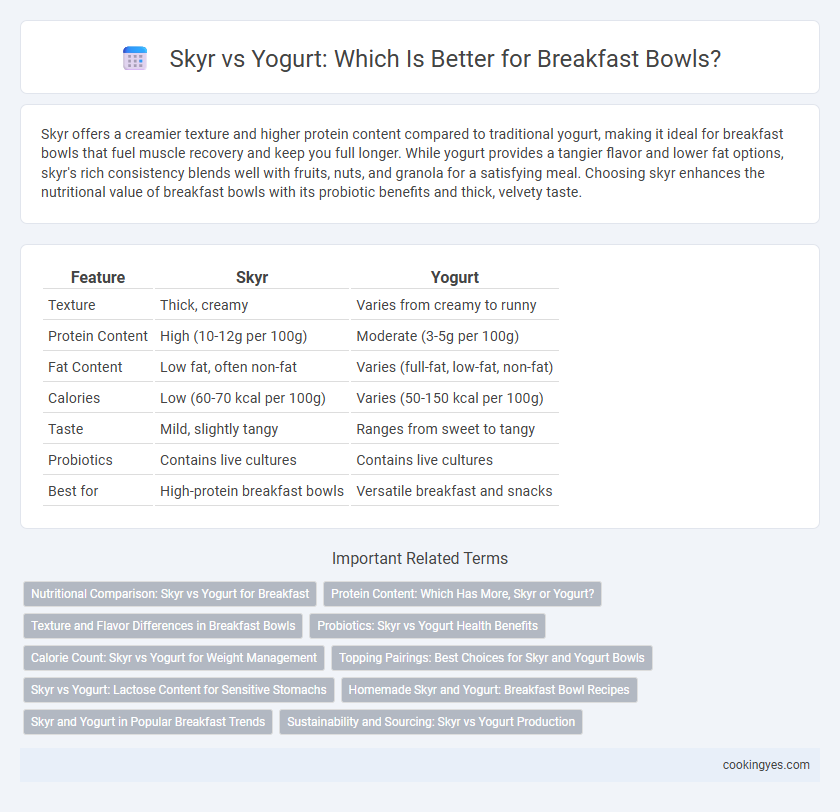Skyr offers a creamier texture and higher protein content compared to traditional yogurt, making it ideal for breakfast bowls that fuel muscle recovery and keep you full longer. While yogurt provides a tangier flavor and lower fat options, skyr's rich consistency blends well with fruits, nuts, and granola for a satisfying meal. Choosing skyr enhances the nutritional value of breakfast bowls with its probiotic benefits and thick, velvety taste.
Table of Comparison
| Feature | Skyr | Yogurt |
|---|---|---|
| Texture | Thick, creamy | Varies from creamy to runny |
| Protein Content | High (10-12g per 100g) | Moderate (3-5g per 100g) |
| Fat Content | Low fat, often non-fat | Varies (full-fat, low-fat, non-fat) |
| Calories | Low (60-70 kcal per 100g) | Varies (50-150 kcal per 100g) |
| Taste | Mild, slightly tangy | Ranges from sweet to tangy |
| Probiotics | Contains live cultures | Contains live cultures |
| Best for | High-protein breakfast bowls | Versatile breakfast and snacks |
Nutritional Comparison: Skyr vs Yogurt for Breakfast
Skyr contains higher protein content, averaging 11 grams per 100 grams, compared to traditional yogurt's 5 grams, making it an excellent choice for muscle repair and satiety. Both Skyr and yogurt offer probiotics beneficial for gut health, but Skyr typically has a thicker texture and lower fat content, supporting weight management goals. Skyr's rich calcium levels, around 150 mg per 100 grams, closely match yogurt's values, contributing to strong bone health when included in breakfast bowls.
Protein Content: Which Has More, Skyr or Yogurt?
Skyr contains significantly more protein compared to traditional yogurt, with an average of 10-12 grams per 100 grams, while regular yogurt typically provides 4-6 grams per 100 grams. This high protein content in Skyr makes it a superior choice for breakfast bowls aimed at muscle recovery and sustained satiety. Athletes and fitness enthusiasts often prefer Skyr due to its creamy texture combined with its rich protein density.
Texture and Flavor Differences in Breakfast Bowls
Skyr offers a thicker and creamier texture compared to traditional yogurt, making it ideal for breakfast bowls that require a rich, filling base. Its mild, tangy flavor contrasts with the more pronounced tartness found in regular yogurt, providing a smoother taste experience. These differences enhance the overall mouthfeel and flavor balance in breakfast bowls, complementing fruits, nuts, and granola.
Probiotics: Skyr vs Yogurt Health Benefits
Skyr contains a higher concentration of probiotics compared to traditional yogurt, promoting improved gut health and stronger immune function. The specific strains of live cultures in Skyr, such as Lactobacillus acidophilus and Bifidobacterium, enhance digestion and nutrient absorption more effectively. Regular consumption of probiotic-rich Skyr supports a balanced microbiome, reducing inflammation and supporting overall digestive wellness in breakfast bowls.
Calorie Count: Skyr vs Yogurt for Weight Management
Skyr typically contains fewer calories than traditional yogurt, making it a favorable option for weight management in breakfast bowls. Its high protein content also promotes satiety, reducing overall calorie intake throughout the day. Choosing Skyr can support calorie control while providing essential nutrients for a balanced breakfast.
Topping Pairings: Best Choices for Skyr and Yogurt Bowls
Skyr pairs exceptionally well with toppings like fresh berries, granola, and a drizzle of honey, enhancing its thick texture and mild tanginess. Yogurt bowls benefit from a wider variety of toppings, including tropical fruits, nuts, and seeds, which complement its creamy consistency and slightly tart flavor. Both Skyr and yogurt can be elevated with a sprinkle of chia seeds or dark chocolate shavings for added texture and nutritional value.
Skyr vs Yogurt: Lactose Content for Sensitive Stomachs
Skyr contains significantly less lactose than traditional yogurt, making it a better option for individuals with lactose intolerance or sensitive stomachs. The fermentation process in Skyr reduces lactose levels, often below 0.5%, whereas regular yogurt can contain about 2-4% lactose. Choosing Skyr for breakfast bowls supports easier digestion while providing high protein content and creamy texture.
Homemade Skyr and Yogurt: Breakfast Bowl Recipes
Homemade skyr offers a thicker, high-protein alternative to traditional yogurt, making it ideal for nutrient-dense breakfast bowls rich in probiotics and calcium. Both skyr and yogurt can be customized with fresh fruits, nuts, and seeds to enhance texture and flavor while keeping the meal wholesome. Incorporating either in breakfast bowls supports digestion, boosts energy, and provides essential vitamins for a balanced morning meal.
Skyr and Yogurt in Popular Breakfast Trends
Skyr and yogurt both hold prominent places in popular breakfast trends due to their rich protein content and creamy texture, making them ideal for nutritious breakfast bowls. Skyr, an Icelandic dairy product, offers higher protein levels and lower fat compared to traditional yogurt, appealing to health-conscious consumers seeking muscle-building and weight management benefits. Incorporating fresh fruits, nuts, and seeds, both Skyr and yogurt provide versatile bases that enhance fiber intake and support digestive health in morning meals.
Sustainability and Sourcing: Skyr vs Yogurt Production
Skyr production emphasizes sustainability through the use of traditional Icelandic methods that require less energy and water compared to conventional yogurt manufacturing. Yogurt sourcing varies widely, with some producers prioritizing organic and locally-sourced milk to reduce carbon footprints, while others rely on large-scale industrial dairy farming with higher environmental impacts. Sustainable breakfast bowls often highlight Skyr for its low-resource production and Icelandic provenance, contrasting with yogurt options that depend heavily on sourcing practices and supply chain transparency.
Skyr vs yogurt for breakfast bowls Infographic

 cookingyes.com
cookingyes.com